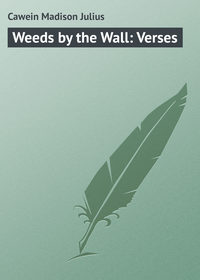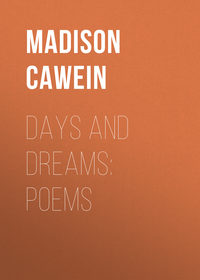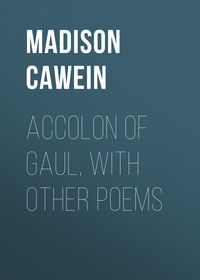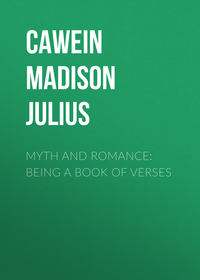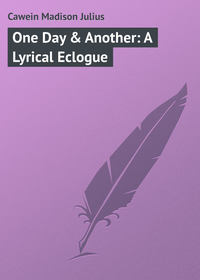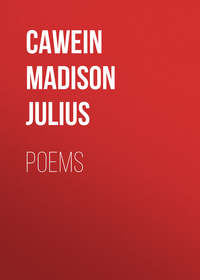The Poems of Madison Cawein. Volume 2 (of 5)
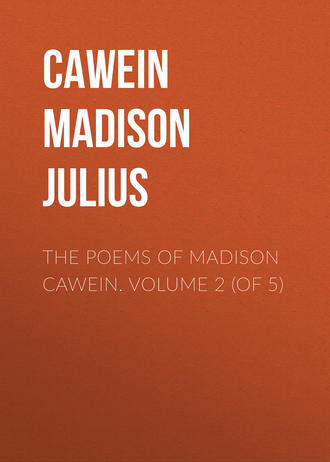 полная версия
полная версияThe Poems of Madison Cawein. Volume 2 (of 5)
Жанр: зарубежная поэзиязарубежная классиказарубежная старинная литературастихи и поэзиясерьезное чтениеcтихи, поэзия
Язык: Английский
Год издания: 2018
Добавлена:
Настройки чтения
Размер шрифта
Высота строк
Поля
VIII
The storm is heard sounding wildly outside with wind and hail:The night is wild with rain and sleet;Each loose-warped casement claps or groans:I hear the plangent woodland beatThe tempest with long blatant moans,Like one who fears defeat.And sitting here beyond the storm,Alone within the lonely house,It seems that some mesmeric charmHolds all things—even the gnawing mouseHas ceased its faint alarm.And in the silence, stolen o’erFamiliar objects, lo, I fear—I fear—that, opening yon door,I ’ll find my dead self standing near,With face that once I wore.The stairway creaks with ghostly gusts:The flue moans; all its gorgon throatOne wail of winds: ancestral dusts,—Which yonder Indian war-gear coatWith gray, whose quiver rusts,—Are shaken down.—Or, can it be,That he who wore it in the dance,Or battle, now fills shadowyIts wampumed skins? and shakes his lanceAnd spectral plume at me?—Mere fancy!—Yet those curtains tossMysteriously as if some darkHand moved them.—And I would not crossThe shadow there, that hearthstone’s spark,A glow-worm sunk in moss.Outside ’t were better!—Yes, I yearnTo walk the waste where sway and dipDeep, dark December boughs—where burnSome late last leaves, that drip and dripNo matter where you turn.Where sodden soil, you scarce have trod,Fills oozy footprints—but the blindNight there, though like the frown of God,Presents no fancies to the mind,Like those that have o’erawed.—The months I count: how long it seemsSince summer! summer, when with her,When on her porch, in rainy gleamsWe watched the flickering lightning stirIn heavens gray as dreams.When all the west, a sheet of gold,Flared,—like some Titan’s opened forge,—With storm; revealing, manifold,Vast peaks of clouds with crag and gorge,Where thunder-torrents rolled.Then came the wind: again, againStorm lit the instant earth—and howThe forest rang with roaring rain!—We could not read—where is it now?—That tale of Charlemagne:That old romance! that tale, which weWere reading; till we heard the plungeOf distant thunder sullenly,And left to watch the lightning lunge,And storm-winds toss each tree.That summer!—How it built us there,Of sorcery and necromance,A mental-world, where all was fair;A land like one great pearl, a-tranceWith lilied light and air.Where every flower was a thought;And every bird, a melody;And every fragrance, zephyr brought,Was but the rainbowed draperyOf some sweet dream long sought.’Mid which we reared our heart’s high home,Fair on the hills; with terraces,Vine-hung and wooded, o’er the foamOf undiscovered fairy seas,All violet in the gloam.O land of shadows! shadow-home,Within my world of memories!Around whose ruins sweeps the foamOf sorrow’s immemorial seas,To whose dark shores I come!How long in your wrecked halls, aloneWith ghosts of joys must I remain?Between the unknown and the known,Still hearing through the wind and rainMy lost love moan and moan.IX
He sits by the slowly dying fire. The storm is heard with increased violence:Wild weather. The lash of the sleetOn the gusty casement, clapping—The sound of the storm like a sheetMy soul and senses wrapping.Wild weather. And how is she,Now the rush of the rain falls serriedThere on the turf and the treeOf the place where she is buried?Wild weather. How black and deepIs the night where the mad winds scurry!—Do I sleep? do I dream in my sleepThat I hear her footsteps hurry?Hither they come like flowers—And I see her raiment glisten,Like the robes of one of the hoursWhere the stars to the angels listen.Before me, behold, how she stands!With lips high thoughts have weighted,With testifying hands,And eyes with glory sated.I have spoken and I have kneeled:I have kissed her feet in wonder—But, lo! her lips—they are sealed,God-sealed, and will not sunder.Though I sob, “Your stay was long!You are come,—but your feet were laggard!—With mansuetude and songFor the heart your death has daggered.”Never a word replies,Never, to all my weeping—Only a sound of sighs,And of raiment past me sweeping....I wake; and a clock tolls three—And the night and the storm beat serriedThere on the turf and the treeOf the place where she is buried.RED LEAVES AND ROSES
I
And he had lived such loveless yearsThat suffering had made him wise;And she had known no graver tearsThan those of girlhood’s eyes.And he, perhaps, had loved before—One, who had wedded, or had died;—So life to him had been but poorIn love for which he sighed.In years and heart she was so youngLove paused and beckoned at the gate,And bade her hear his songs, unsung;She laughed that “love must wait.”He understood. She only knewLove’s hair was faded, face was gray—Nor saw the rose his autumn blewThere in her heedless way.II
If he had come to her when MayDanced down the wildwood,—every wayMarked with white flow’rs, as if her gownHad torn and fallen,—it might beShe had not met him with a frown,Nor used his love so bitterly.Or if he had but come when JuneSet stars and roses to one tune,And breathed in honeysuckle throatsClove-honey of her spicy mouth,His heart had found some loving notesIn hers to cheer his life’s long drouth.He came when Fall made mad the sky,And on the hills leapt like a cryOf battle; when his youth was dead;To her, the young, the wild, the white;Whose symbol was the rose, blood-red,And his the red leaf pinched with blight.He might have known, since youth was flown,And autumn claimed him for its own;And winter neared with snow, wild whirled,His love to her would seem absurd;To youth like hers; whose lip had curledYet heard him to his last sad word.Then laughed and—well, his heart deniedThe words he uttered then in pride;And he remembered how the grayWas his of autumn, ah! and hers,The rose-hued colors of the May,And May was all her universe.And then he left her: and, like blood,In her deep hair, the rose; whose budWas badge to her: while unto him,His middle-age, must still remainThe red-leaf, withering at the rim,As symbol of the all-in-vain.III
“Such days as these,” she said, and bentAmong her marigolds, all dew,And dripping zinnia stems, “were meantFor spring not autumn; days we knewIn childhood; these endearing those;Much dearer since they have grown old:Days, once imperfect with the rose,Now perfect with the marigold.”“Such days as these,” he said, and gazedLong with unlifted eyes that heldSad autumn nights, “our hopes have raisedIn futures that are mist-enspelled.And so it is the fog blows inDays dearer for the death they paintWith hues of life and joy,—as sin,At death, puts off all earthly taint.”IV
Like deeds of hearts that have not keptTheir riches, as a miser, whenSad souls have asked, with eyes that wept,Among the toiling tribes of men,The summer days gave Earth sweet almsIn silver of white lilies, whileEach night, with healing, outstretched palmsStood Christ-like with its starry smile.Will she remember him when dullMonths drag their duller hours by?With feet that crush the beautifulAnd leave the beautiful to die?Or never see? nor sit with lostDreams withered, ’mid hope’s empty husks,And wait, heart-counting-up the costOf love’s illusions ’mid life’s dusks?V
He is as one who, treading salty scurfOf lonely sea-sands, hears the roaring rocksOf some lost isle of misty crags and lochs;Who sees no sea, but, through a world of surf,Gray ghosts of gulls and screaming petrel flocks:When, from the deep’s white ruin and wild wreck,Above the fog, beneath the ghostly gull,The iron ribs of some storm-shattered hullLoom, packed with pirate treasure to the deckA century rotten: feels his wealth replete,When long-baulked ocean claims it; and one dullWave flings, derisive at despondent feet,A skull, one doubloon rattling in the skull.VI
And when full autumn sets the dahlia stemsOn fire with flowers, and the chill dew turnsThe maple trees, above geranium urns,To Emir tents, and strings with flawless gemsThe moon-flower and the wahoo-bush that burns;Calmly she sees the year grow sad and strange,And stands with one among the wilted walksOf the old garden of the gray, old grange,And feels no sorrow for the frost-maimed stalksSince—though the wailing autumn to her talks—Youth marks swift spring on life’s far mountain-range.Or she will lean to her old harpsichord;A youthful face beside her; and the glowOf hickory on the hearth will balk the blowOf blustering rain that beats the casement hard;And sing of summer and so thwart the snow.“Haply, some day, she yet may sit alone,”He thinks, “within the shadow-saddened house,When round the gables stormy echoes moan,And in the closet gnaws the lonesome mouse;And Memory come stealing down the stairFrom dusty attics where is piled the Past—Like so much rubbish that we hate to keep—And turn the knob; and, framed in frosty hair,A grave, forgotten face look in at last,And she will know, and bow her head and weep.”WILD THORN AND LILY
I
That night, returning to the farm, we rodeBefore a storm. Uprolling from the west,Incessant with distending fire, loomedThe multitudes of tempest: towering hereA shadowy Shasta, there a cloudy Hood,Veined as with agonies, aurora-born,Of torrent gold; resplendent heaven to heaven,Far peak to peak, terrific spoke; the vastSierras of the storm, within which beatThe caverned thunder like a mighty stream:Vibrating on, with rushing wind and flame,Now th’ opening welkin shone, one livid sheetOf instantaneous gold, a giant’s forge,Wild-clanging; now, with streak on angled streakOf momentary light, a labyrinthWhere shouting Darkness stalked with Titan torch:Again the firmament hung hewn with fireWhence leapt the thunder; and it seemed that hostsOf Heaven rushed to war with blazing shieldsAnd swords of splendor. And before the stormWe galloped, while the frantic trees aboveWent wild with rain, through whose mad limbs and leavesSplashed black the first big drops. On, on we drove,And gained the gates, pillaring the avenueOf ancient beech, at whose far, flickering end,At last, beaconed the lights of home.And she?Was it the lightning that lent lividnessAnd terror to her countenance? or fearOf her own heart? revulsion? memory?Did deep regret, that, now the thing was done,That she was mine, a yearning to be free,Away from me, assail her? or, the thought,The knowledge, that she did not love the manWhom she had wedded? knowing better nowThat all her heart was Julien’s from the first,And would be Julien’s until the end.And did she now look backward on the past?Or forward—on the barrier that the churchFor all the future years had placed betweenThe possible and impossible? God knows!Yet I had won her honestly with wordsLove, only, uttered out of its soul’s truth;Had won her—was it openly?—perhaps!—Although engaged to Julien.—What elseHad led us to elopement?—Well, ’t was done!The whole, mad, lovely, miserable affairOf love and youthful folly. Being doneWe must abide the reckoning. That is,I would; and she?—she saw her duty thereBeside her husband. And within myself,When we alighted from the carriage, thus,—Beneath the porch,—my mind resolved the thing:“I am her husband now, and she my wife.Less than her husband, I, much less a man,Were I not able to regain and keepThe love she gave me, that she thinks is his,That is not his. ’T is pity merely nowThat makes her pensive. I am pensive, too,For Julien, the poet and the friend;The dreamer and the lover.—But all ’s fairIn love they say; and I,—well, willinglyI’ll bear the burthen of the blame of all.”Scarce had we entered when high heaven opedVast gates of bronze and doors of booming brassThat dammed a deluge, and the deluge poured.—I thought of him still; for I felt that sheWas thinking too of Julien and his moods,That often swept his soul with storm like this,Yet oftener with sunlight than with storm;That soul of sun and tempest, ray and rain,My school-friend Julien! whom once she wonTo think she loved—I know not how. My playWas open as the morning, and as fair.His poverty and genius here, and hereMy wealth and—platitude; and I had won.But it was hard for him. I did not dreamThat it would end so. And when GwendolynUsed every gentleness—and that is much—I did not dream his poet’s temperamentWere so affected of a love affair,A wrong or right; he, whose sole aim seemed song.I did not dream he ’d take it desperately,And end so tragically. Who ’d have thoughtHis character, although so sensitive,Would fall into extremes of morbidnessAnd melancholy! Had it now been I,Whose heart had lost in the great game of love,None would have wondered; for I am of thoseWhose vigorous iron does not bend, but breakAt one decisive blow: his should have sprung—Or so I think, not broken as it had—Elastic as fine-tempered steel that bendsAnd then resumes its usual usefulness.A pale smile strained the corners of her mouthWhen, from the porch, into the parlor’s blazeI led her. And her mother met us there,Her mother and her father. And I sawThe slow reflection of their happinessMake glad her eyes, as their approval grewFrom half-severe rebukes, that were well meant,To open, glad avowal of their joy.She had done well, and we were soon forgiven....But I resumed his letter when alone:His letter written her three months before,When all was over, and we two were one,And well upon our way to ItalyFor six sweet months of honeymoon. His word,His letter, all of her, that came to meAt Venice, that I opened in mistake,Amid a lot of papers sent from home.She had not read, and never should while IHad power to conceal until I ’d read.I would not let the dead scrawl mar or soilMy late-won joy, my testament of love.No! I would read it, afterwards destroy.Thoughts made of music for a last farewell,When he knew all and asked her to perpendExpressions of past things her gift of loveHad given speech to in the happy days.And so I read:—II
“The rhyme is mine, but yoursThe thought and all the music, springing fromThe rareness of the love that dawned on meA little while to make my sad life glad.Should I regret the sunset it refused,Since all my morn was richer than the world?Or that my day should stride without a changeOf crimson, or of purple, or of gold,Into the barren blackness where the moonAnd all God’s stars lay dead? Should I complain,Upbraid or censure or one moment curse,I with my morning? ’T is a memoryThat stains the midnight now: one wild-rose rayLaid like a finger pointing me the pathI follow, and I go rejoicingly.Our love was very young (nor had it aged—If we had lived long lifetimes—here in me),When one day, strolling in the sun, you spokeWords I perceived should hint a coming change:I made three stanzas of the thought, you see:But now ’t is like the sea-shell that suggests,And still associates us with the seaIn its vague song and elfland workmanship.Yet it has lost a something that it hadThere by the far sand’s foaming; something rare,A different beauty like an element:I wonder on what life will doWhen love is loser of all love;When life still longs to love anewAnd has not love enough:—I ’ll turn my heart into a ray,And wait—a day?I wonder on what love will holdWhen life is weary of all life;And life and love have both grown oldWith scars of sin and strife:—I’ll change my soul into a flower,And wait—an hour?I wonder on why men forgetThe life that love made laugh; and whyWeak women will remember yetThe life that love made sigh:—I’ll sing my thought into a song,And wait—how long?III
“And once you questioned of our mocking-bird,And of the German nightingale, and IKnowing a sweeter bird than those sweet two,Made fast associates of birds and brooksAnd learned their numbers. Middle April madeThe path of lilac leading to your porchA rift of fallen Paradise; a blueSo full of fragrance that the birds that builtAmong the lilacs thought that God was there,And of God’s goodness they would sing and sing,Till every throat seemed bursting with its song,Note on wild note, diviner each than each.And waiting by the gate, that reached the lane,For you, who gave sweet eloquence to all,The afternoon, the lilacs and the spring,My heart was singing and it sang of you:Two glow-worms are the jewels inHer ears; and underneath her chinA diamond like a firefly:There is no starlight in the skyWhen Gwendolyn stands in the mazeOf woodbine, near the portico;For all the stars are in her gaze,The night and stars I know.A clinging dream of mist the lawnShe wears; and like a bit of dawnHer fan with one red jewel pinned:Among the boughs there breathes no windWhen Gwendolyn comes down the pathOf lilacs from the portico;For all the breeze her coming hath,The beam and breeze I know.Two locust-blooms her hands; and slipsOf eglantine her cheeks and lips;Her hair, a hyacinth of gloom:The balmy buds give no perfumeWhen Gwendolyn draws near to me,The gate beyond the portico;For all aroma sweet is she,All fragrance that I know.Life, love, and faith are in her face,And in her presence all their grace:And my religion is a word,A wish of hers. No mocking-bird,When Gwendolyn laughs near, dare floatOne bubble from the portico;For all of song is in her throat,All music that I know.IV
“The mocking-bird! and then weird fancy filledMy soul with vision, and I saw a songPursue a bird that was no bird—a voiceConcealed in dim expressions of the spring,—Who sits among the forests and the fields,With dark-blue eyes smiling to life the flowers,—Where we strolled happy as the April hills:A sunbeam, all the day that fellUpon the fountain,—Like laughter gurgling in the dellBelow the mountain,—Drank, with its sparkle, one by one,The water-words that, in the sun,Made melody,—the sun-rays tell,—That never yet was done.A moon-ray, that had gone astray’Mid wildwood alleys,Where Echo haunts the forest wayAmong the valleys,The livelong night upon the rocksSlept, hid among girl Echo’s locks,And stole her voice,—the moonbeams say,—That mocks and only mocks.A shadow, that had made its seatAmid the rosesAnd thorns—the bitter and the sweetThat life discloses—Mixed with the rose-balm and the dewAnd crimson thorns that pierced it through,Until its soul,—the shades repeat,—Was portion of them, too.A Fairy found the beam of gold,And ray of glitter;The shadow, whose dim soul did holdBoth sweet and bitter;And made a bird, that haunts the mornAnd night; that flits from flower to thorn,A voice of laughter,—it is told,—Love, mockery, and scorn.V
“Among the white haw-blossoms, where the creekDroned under drifts of dogwood and of haw,The red-bird, like a crimson blossom blownAgainst the snow-white bosom of the Spring,The chaste confusion of her lawny breast,Sang on, prophetic of serener days,As confident as June’s completer hours.And I stood listening like a hind, who hearsA wood-nymph breathing in a forest fluteAmong gray beech-trees of myth-haunted ways:And when it ceased, the memory of the airBlew like a syrinx in my brain: I madeA lyric of the notes that men might know:He flies with flirt and fluting—As flies a falling starFrom flaming star-beds shooting shooting—From where the roses are.Wings past and sings; and sevenNotes, sweet as fragrance is,—That turn to sylphs in heaven,—Float round him full of bliss.He sings; each burning featherThrills, throbbing at his throat;A song of glow-worm weather,And of a firefly boat:Of Elfland and a princessWho, born of a perfume,His music lulls,—where wincesThat rose’s cradled bloom.No bird is half so airy,No bird of dusk or dawn,O masking King of Fairy!O red-crowned Oberon.VI
“Alas! the nightingale I never heard.Yet I, remembering how your voice would thrillMe with exalted expectation, feltThe passion-throated nightingale would winInto my soul in some wild way like this,With reminiscences of dusks long dead,Presentiments of nights, that mate the flowersAnd the prompt stars, and marry them with song.Of such,—love whispered me when deep in dreams,—I made my nightingale. It is a voiceHeard in the April of our year of love:Between the stars and rosesThere lies a path no man may see,Where every breeze that blows isA wandering melody;Down which each bright star gazesUpon each rose that raisesIts face up lovingly,As if with prayers and praises.The star and rose are wiserThan all but love beneath the skies;No hoard of any miserIs rich as these are wise:No bee may reach or rifle,No mist may cloud or stifleTheir love that never dies,That knows nor trick nor trifle.There is a bird that carriesLove-messages; and comes and goesBetween each star that tarries,And every rose that blows:A bird that can not tire,Whose throat ’s a throbbing lyre,Whose song is now a rose,And now a starry fire.VII
“O May-time woods! O May-time lanes and hours!And stars, that knew how often there at nightBeside the path, where woodbine odors blewBetween the drowsy eyelids of the dusk,—When, like a great, white, pearly moth, the moonHung, silvering long windows of your room,—I stood among the shrubs! The dark house slept.I watched and waited for—I know not what—Some tremor of your gown: a velvet leaf’sUnfolding to caresses of the spring:A rustle of your footsteps: or the dewThat softly rolled, a syllable of love,In sweet avowal, from a rose’s lipsOf odorous scarlet: or the whispered wordOf something lovelier than new leaf or rose—The word young lips half murmur in a dream:Serene with sleep, light visions load her eyes;And underneath her window blooms a quince.The night is a sultana who doth riseIn slippered caution, to admit a prince,Love, who her eunuchs and her lord defies.Are these her dreams? or is it that the breezePelts me with petals of the quince, and liftsThe Balm-of-Gilead buds? and seems to squeezeAroma on aroma through sweet riftsOf Eden, dripping from the rainy trees?Along the path the buckeye trees beginTo heap their hills of blossoms.—Oh, that theyWere Romeo ladders, whereby I might winHer chamber’s sanctity,—where love must prayAnd guard her soul!—so stainless of all sin!There might I see the balsam scent eraseIts sweet intrusion; and the starry nightConclude majestic pomp; the virgin graceOf every bud abashed before the white,Pure passion-flower of her sleeping face.VIII
“And once, in early May, a sparrow sangAmong the garden bushes; and you askedIf the suave song stayed knocking at my heart.I smiled some answer, and, behold, that nightFound that my heart had locked this fancy in:Rain, rain, and a ribbon of songUncurled where the blossoms are sprinkled;The song-sparrow sings, and I longFor, the silver-sweet throat, that has tinkled,To sing in the bloom and the rain,Sing again, and again, and again,Under my window-pane.Rain, rain, and the trickling tipsOf the million pink blooms of the quinces;And I hear the song rill from the lips,The lute-haunted lips of my princess:O love! in the rain and the bloom,Sing again in the pelting perfume,Sweetheart, under my room.Rain, rain, and the dripping of dropsFrom cups of the blossoms they load, orTilt over with tipsiest tops:And eyes as of sun-beam and odor,There, under the bloom-blowing tree—A face like a flower to see,Love is looking at me.IX
“Once in the village I had heard a song,A melody which I wrote down for you,And which you sang. But, there among your hills,The dawns and sunsets and the serious starsMade trite its thought and words, that seemed as staleAs musty parlors of the commonplace.I changed its words, and here and there its thought,But, though you praised, you never sang it more,And so I knew, like some poor poet, itHad fallen on disfavor, God knows why,With its high patron. Thus its metre ran:Look, happy eyes, and let me knowThe timid flower her love hath cherishedFades not before the fruit shall show,Seen in the clear truth of your glowWhere naught of love hath perished.Lift, happy lips, and let me takeThe sacred secret of her spiritTo mine in kisses, that shall makeMute marriage of our souls, and wakeThe heart’s sweet silence near it.X
“And so I wrote another filled with birds,Deliberate twilight and eve’s punctual star;And made the music of that song obeyThe metre of my own and melody:Only to hear that you love me,Only to feel it is true;Stars and the gloaming above me,I in the gloaming with you.Staining through violet fire,A sunset of poppy and gold,Red as a heart with desire,Rich with a secret untold.Deep where the shadows are doubled,Deep where the blossoms are long,Listen!—deep love in the bubbledBreath of a mocking-bird’s song.You, who have made them the dearer,Drawing them near from afar!—Stars and the heaven the nearer,Sweet, through the joy that you are.

